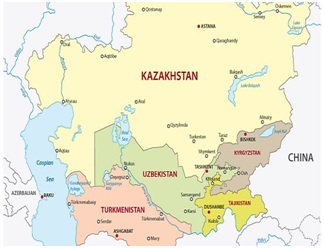

Context
India and five central Asian countries asserted the need for Afghanistan to have a “truly representative and inclusive” government and the need for immediate humanitarian aid for Afghan people.
- This consensus was announced in the joint statementof the third India-Central Asia dialogue.
- It was attended by the foreign ministers of Kazakhstan, Uzbekistan, Tajikistan, Kyrgyzstan and Turkmenistan.
Background
- India shares close historical and cultural linkages with the Central Asian region.
- The mutuality of rich cultural heritage has laid the foundation of diplomatic engagement and people-to-people contact in modern times.
- However, the bilateral relations have gained momentum in the recent past.
- PM Modi’s visit to the five Central Asian countries in 2015 and India’s permanent membership to the Shanghai Cooperation Organization (SCO) in 2017 have paved the way for elevated strategic cooperation between India and Central Asian Republics after the launch of Connect Central Asia Policy in 2012.
- In addition to this, the India-Central Asia dialogue mechanism has honed India’s outreach to this region.
Analysis
Key-highlights of the Summit
- Similar concerns and objectives in Afghanistan
- India and the Central Asian countries had similar concerns and objectives in Afghanistan. (Turkmenistan, Uzbekistan, and Tajikistan — share borders with Afghanistan)
- The countries flagged the goals of “a truly inclusive and representative government, the fight against terrorism and drug trafficking, ensuring unhindered humanitarian assistance, and preserving the rights of women, children, and the minorities”.
- All of them “unequivocally” stated their support for UNSC Resolution 2593 (2021), which demands that Afghan territory not be used for sheltering, training, planning or financing terrorist acts and calls for concerted action against all terrorist groups.
Connectivity
- India welcomed the interest shown by the Central Asian states in using Shahid Beheshti terminal at Iran’s Chabahar port, which is operated by an Indian company, for trade with India and beyond, according to a joint statement.
- All the sides agreed to develop the transit and transport potential of their countries, improve the regional logistics network and promote joint initiatives to create new transport corridors.
Voice against terrorism
- The ministers condemned all forms of terrorism and opposed “providing safe haven, using terrorist proxies for cross-border terrorism, terror financing, arms and drugs trafficking, dissemination of a radical ideology and abuse of cyber space to spread disinformation and incite violence.
The interesting skip
- As India interacted with the Central Asia republics in New Delhi, Islamabad hosted the 17th extraordinary session of the Organisation of Islamic Cooperation’s (OIC) Council of Foreign Ministers.
- Significantly, the foreign ministers of the five Central Asian countries are also members of the OIC grouping, and they skipped the meeting in Islamabad to attend the dialogue in New Delhi.
What is Central Asia?
- Central Asia is a landlocked region, which is located in the heart of Asia. It forms a part of India’s extended neighbourhood.
- The region is composed of the 5 post-soviet countries:
- Kazakhstan
- Uzbekistan
- Turkmenistan
- Kyrgyzstan
- Tajikistan
- The countries are also known as 5 “Stans” due to the same ending in their names.
- It is bounded on the north by Russia and on the south by Iran, Afghanistan, and China.

Why Central Asia assumes significance for India?
- Geo-strategic location: Its geographical proximity, strategic location, and historical linkages make it an important partner for New Delhi.
- Energy hub: Central Asia has an abundance of oil and gas deposits. The region contains vast hydrocarbon fields both on-shore and off-shore in the Caspian Sea which homes around 4 percent of the world’s natural gas reserves and approximately 3 percent of oil reserves.
- Gas (Turkmenistan)
- Oil, gas and uranium (Kazakhstan)
- Uranium and gas (Uzbekistan)
- Hydropower (Tajikistan and Kyrgyzstan)
- Global power hub: Strategically, Central Asia is emerging as the next high-stakes competition ground for global powers, hence, it would behoove India to pay closer attention.
- Leading role: Central Asia provides India with the right platform to leverage its political, economic, and cultural connections to play a leading role in Eurasia.
- Significant transportation hub: The region is a major transportation hub for gas and oil pipelines and multi-modal corridors connecting China, Russia, Europe, and the IOR.
How India is increasing engagement with the region?
- Connect Central Asia Policy: India’s ‘Connect Central Asia Policy’ covers an entire gamut of a multi-model approach to strengthen politico-economic, security, and cultural ties between the two.
- India is also involved in three connectivity initiatives that involve Central Asia. These initiatives are the:
- International North South Transport Corridor (INSTC)
- the Ashgabat Agreement
- the development of Chabahar Port in Iran
|
Connectivity Initiatives
|
Way forward
India has invited all the heads of Central Asian states, as a special and smart gesture, to participate as Chief Guests at the Republic Day next year as India celebrates her 75 Azadi ka Amrit Maahotsav. New Delhi is also expected to organize an India-Central Asia leaders summit in January 2022.
These developments are likely to advance India’s outreach to its extended neighbourhood and be a game changer as the region wades through the great power competition.


